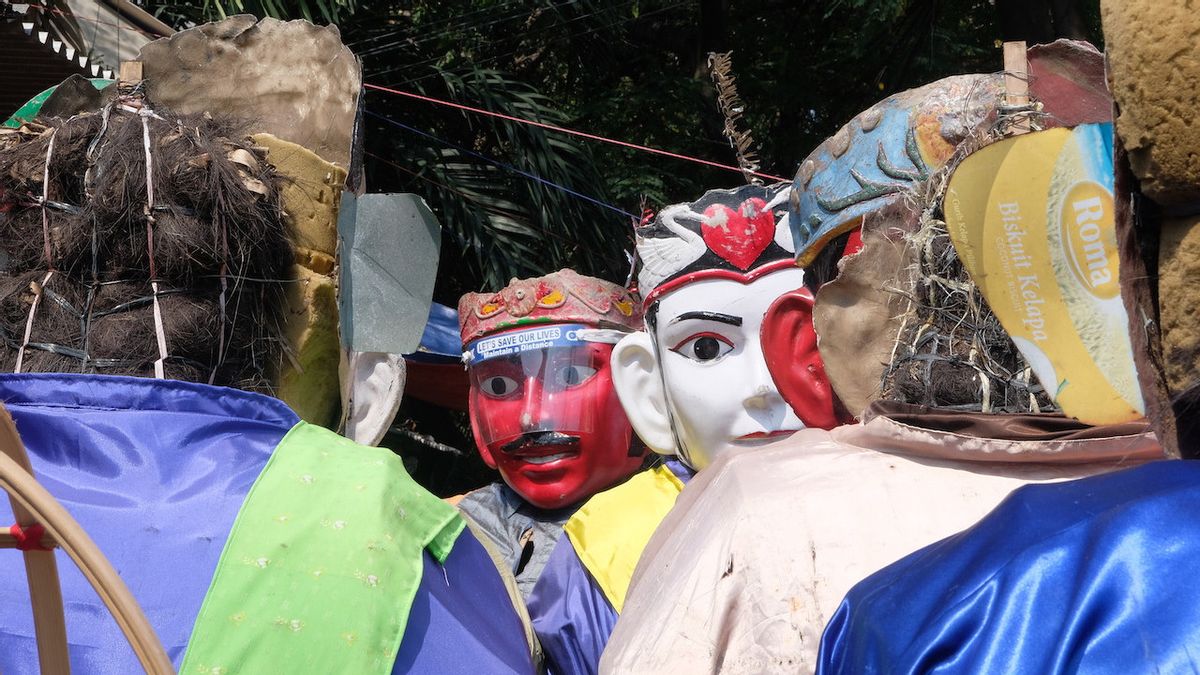JAKARTA - Ondel-ondel street singers have been targeted by Satpol PP control. We went to the village of 'Ondel-Ondel' Kramat Pulo. If the DKI Provincial Government's ban aims to protect Betawi traditional and cultural values, the residents of Kramat Pulo have a competing perspective on how the craftsmen and buskers protect their survival through ondel-ondel.
The existence of ondel-ondel buskers in Jakarta has been a long-standing concern for the DKI Jakarta Provincial Government. In the days of Joko Widodo (Jokowi) and Basuki Tjahaja Purnama (Ahok), ondel-ondel singers were banned.
At that time the DKI Provincial Government used Regional Regulation (Perda) Number 8 of 2007 concerning Public Order as the basis for controlling. Raised and drowned, now the anti-street singer ondel-ondel has emerged again.
Deputy Governor of DKI Jakarta Ahmad Riza Patria said that the DKI Jakarta Provincial Government wants the ondel-ondel singers to be disciplined to maintain the nobility of Betawi culture. According to Riza, the nation's culture, including ondel-ondel, must be placed in a good place.
"Not intended to earn money by singing and so on. We will find a place for those who have been singing," said Riza when met in Kamal Muara, Penjaringan, North Jakarta quoted by Antara, Sunday, March 28.
Visiting the 'Ondel-Ondel Village' in Senen[Click to Taste]
Sunday, March 28th, we visited 'Kampung Ondel-Ondel' at Kramat Pulo, Senen, Central Jakarta. This area is the center for ondel-ondel craftsmen. In the morning, at 09.00 WIB, we arrived at the location. Right time. The life of the ondel-ondel craftsman and busker has begun that second.
Even though this cultural center is in the middle of the city, it does not mean that Ondel-Ondel Village is located in an established location. To get there, we passed a road two cars wide. On the left and right of the village, houses are close together. Dangdut music shouted from many houses. The existence of ondel-ondel on the corner of the street and houses makes this scene feel distinctive.
Obviously, ondel-ondel has become an important part of the life of the people of Kramat Pulo. In this village, ondel-ondel is made in a studio or individually. Both young and old alike seem to be adept at making ondel-ondel. We met one of them: Yadi.
Yadi explained many things related to ondel-ondel, including how to make it. Yadi said, it took all day to make one barongan (ondel-ondel). One of the most important things in the manufacturing process is the selection of bamboo. The quality must be good. Bamboo should not break easily when formed in a circle.
The collected bamboos will be split and shaved to make the ondel-ondel inner frame. Yadi said that the process of making this frame was both the most crucial and the most difficult. After the frame is finished, the ondel-ondel manufacturing process tends to be easier.
The surface of the ondel-ondel is simply covered with sheets of underwear, scarves, and skirts, which are arranged to resemble a suit. The color of the clothes usually follows the tastes of the ondel-ondel customer.
Another important element is the ondel-ondel mask. Although it is not as difficult as making a frame, the ondel-ondel mask is a 'face' that must be made with care. It is said to be easy because the making of an ondel-ondel mask only needs to be printed using a special print.
It needs accuracy because the mask that has been printed is then sanded until it is smooth and smooth. After that, the masks were putty, painted, and painted with oil paint according to the male and female ondel-ondel characters. In accordance with indigenous customs and culture, male ondel is made with a red face. Meanwhile, a white-faced woman's ondel-ondel.
The final touch is the addition of a coconut flower ornament made from a stick attached to the head of the ondel-ondel. Other additions can also be done by attaching a variety of typical Betawi accessories, such as machetes for men's ondel-ondel and various jewelery for women's ondel-ondel. Ondel-ondel is ready to be sold.
One ondel-ondel or what he also calls barongan is valued at around Rp. 2 million. The money is usually shared with three of his friends. In normal situations, this job is not bad. Moreover, Yadi also has a number of ondel-ondel that he rented. Well, the ondel-ondel for rent is what many buskers use on the streets.
Ondel-ondel buskersYadi did not set a price for the ondel-ondel he rented. Yadi chose a profit sharing system through deposit. The income is uncertain. Sometimes it can be minimal in the thousands. Next time it can be a relief in the hundreds of thousands.
"So, deposit. Some have their own. If the person has capital, he buys it himself. If this is the same as this. It is also not targeted to have to pay so much. Not. Never mind that word. Trade alone is not certain, right? You can make a profit, then you will lose. That's the case with the busking too. "
"I've been on the road to ngamen, getting Rp.5 thousand silver. That used a tool. Previously there were not many (other ondel-ondel buskers). Still using the tool got Rp.5 thousand silver. Because the tool was damaged. Got Rp.5 thousand silver. ever, "added Yadi.
Yadi's expression changed when he talked about the restlessness he felt about the DKI Jakarta Provincial Government wanting to completely ban ondel-ondel buskers from the streets of the Capital City. Yadi said, if ondel-ondel doesn't work, then he can't support his family.
"During the pandemic I didn't have any income. Those who fought with chants because of their finances. Yes, it's normal for us to chant like this. Because we don't have any income," Yadi said.
"If you can't sing, what do you do, sir? There is a call. If there is a call. If not? How come I have to wait for a call. Yes, right? That means if you want to eat, you have to wait for a call? People were hurting to death, "he added.
When we came there, a number of residents in Kramat Pulo 'Ondel-Ondel' Village had just been sent home. There are seven to eight of them. Previously they were arrested by Satpol PP for busking with ondel-ondel on the streets. According to Yadi, the condition was getting more and more difficult.
"A lot of them were caught yesterday. There were eight. Seven or eight. Just came home. Then they took them on a bajaj. So, Bajaj is another fare, right?" Apart from the direct financial burden, the arrests also traumatized the street singers.
DilemmaYadi and his colleagues in Kampung 'Ondel-Ondel' Kramat Pulo are not ignorant of the sacredness of ondel-ondel in Betawi customs and culture. But he saw no other opportunity to make ends meet day after day apart from bringing ondel-ondel to the streets.
Yadi is a Betawi native from Rawa Belong. And he is not a new player in the ondel-ondel craft business. This work is a legacy from generation to generation to his family.
Yadi himself initially focused as a miniature ondel-ondel craftsman. He supplied the handicrafts to the Betawi Cultural Village of Setu Babakan, Jagakarsa, South Jakarta. However, the pandemic reduced the number of orders, along with reduced tourist activity in Setu Babakan.
Yadi proposed a counter point of view from the socio-economic side. Good. For example, ondel-ondel has sacredness as a cultural custom that must be preserved. But, if ondel-ondel can help the society's socio-economic situation which is full of difficulties, how?
"If you want to be banned, give a solution. If you can't sing, give me a container. What is the solution to this one so that these children are not unemployed. Now, if you can't sing, like it or not, there's a lot of unemployment. The fall of what? Thief, right? It's good like this. Want to walk ondel-ondel busking. Instead of him doing something wrong, right? ”
TASTE JOURNALISM OtherThe English, Chinese, Japanese, Arabic, and French versions are automatically generated by the AI. So there may still be inaccuracies in translating, please always see Indonesian as our main language. (system supported by DigitalSiber.id)













